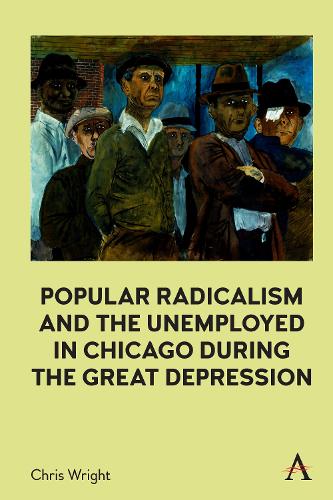
Popular Radicalism and the Unemployed in Chicago during the Great Depression
(Hardback)
Publishing Details
Popular Radicalism and the Unemployed in Chicago during the Great Depression
By (Author) Chris Wright
Anthem Press
Anthem Press
14th June 2022
United Kingdom
Classifications
Professional and Scholarly
Non Fiction
331.13797731109043
Physical Properties
Hardback
274
Width 153mm, Height 229mm, Spine 26mm
454g
Description
In a time when mass joblessness and precarious employment are becoming issues of national concern, it is useful to reconsider the experiences of the unemployed in an earlier period of economic hardship, the Great Depression. Focusing on the bellwether city of Chicago, this book reevaluates those struggles, revealing the kernel of political radicalism and class resistance in practices that are usually thought of as apolitical and un-ideological. From communal sharing to eviction riots, from Unemployed Councils to the nationwide movement behind the remarkable Workers Unemployment Insurance Bill, millions of people fought to end the reign of capitalist values and usher in a new, more socialistic society. Today, their legacy is their resilience, their resourcefulness, and their proof that the unemployed can organize themselves to renew the struggle for a more just world.
Reviews
In Popular Radicalism and the Unemployed, Chris Wright uncovers a deep vein of activism during the Great Depression. By focusing mostly on industrial workers, scholars have missed layers of protest expressed not just in words but in deeds by the eras most deprived, the chronically unemployed. Wright shows us a web of activities, often centered in unions and churches. The jobless and homeless held onto a strong sense of mutuality, and they even organized sit-ins, demonstrations, hunger marches, all with clearly articulated policy goals. Popular Radicalism and the Unemployed urges us to rethink the alleged inertia of societys most oppressed then and now, and thereby to rethink social class. Elliot J. Gorn, Professor, Joseph A. Gagliano Chair in American Urban History, Loyola University Chicago, USA.
In this timely work that examines mass unemployment in 1930s Chicago, Chris Wright tells a powerful story of the active resistance of unemployed people against dehumanizing, capitalist forces. He demonstrates the power of community and solidarity among Chicagos unemployed and argues for the radical potential of all humans desire for dignity and recognition. Randi Storch, Distinguished Teaching Professor, SUNY Cortland, USA.
Popular Radicalism and the Unemployed in Chicago during the Great Depression offers a superb understanding of how the unemployed experienced life throughout the Great Depression. Christopher Wrights extensive archival research provides insights that challenge popular assumptions of life during the Depression. It is a wonderful addition to the literature focused on American life at the grass root level throughout the 1930s. Ryan S. Pettengill, Professor of History, Collin College and the author of Communists and Community: Activism in Detroits Labor Movement, 19411956.
Author Bio
Chris Wright is Adjunct Assistant Professor of History at the City University of New York. He is the author of Worker Cooperatives and Revolution: History and Possibilities in the United States (2014). His writing has appeared in the Washington Post, Dissent, Truthout, and other publications.
